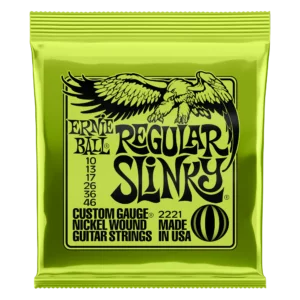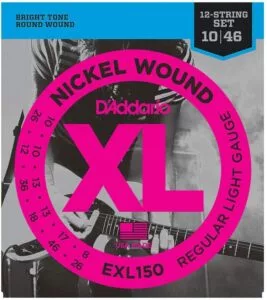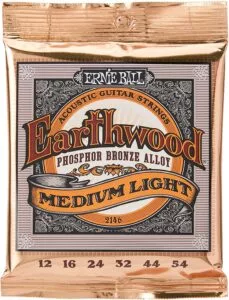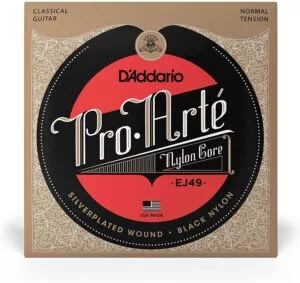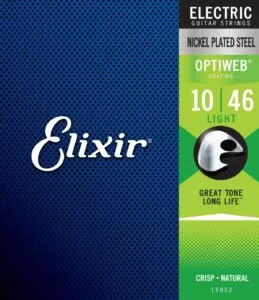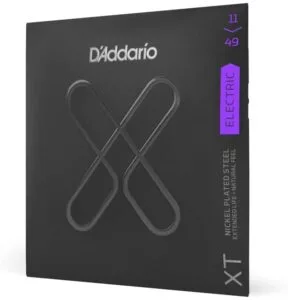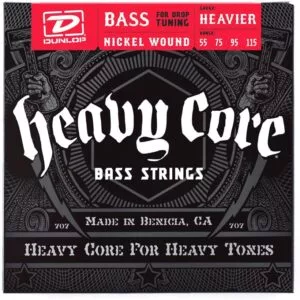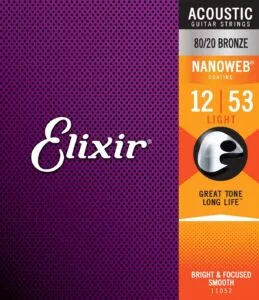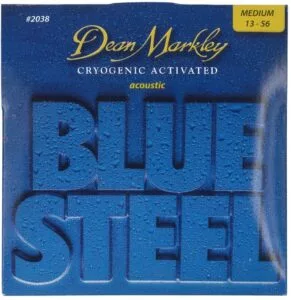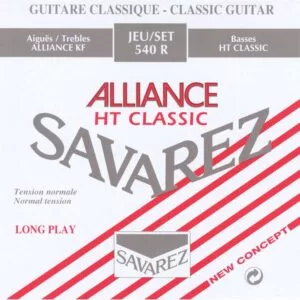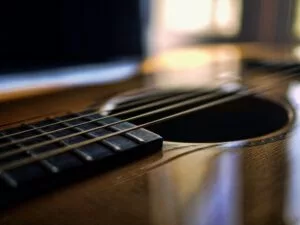
The Best Guitar Strings in Canada
Guitarists are notoriously obsessed with tone. From Eddie Van Halen’s constant experimentations with different electronics, to Jack White’s extensive collection of vintage gear including different guitars, amps and effects, guitarists are always looking to add new sounds and textures to their playing. However, one component that is super influential regarding your tone that does not get talked about too much is your guitar strings.
While you need guitar strings to play guitar, many do not realize how integral they are to your sound. If your guitar starts sounding dull and flat, you likely need new strings. However, if you are looking to improve your sound, start playing in a different tuning, or want to explore the different sonic possibilities that $10 dollars can make to your guitar, experimenting with new guitar strings is a smart idea.
If you are looking for a new acoustic guitar, we have written an article for the best acoustic guitar across any budget here.
Our top picks
Things to consider when shopping for guitar strings
Guitar – While guitar strings do influence the sound of your guitar, the guitar itself will really dictate the sound of your guitar when all is ready to play. While the vibration of the guitar strings is what makes your guitar generate sound, the resonance of the strings against your guitar and its components (including the inside of your acoustic guitar, or the pickups on your electric).
Knowing what strings goes well with guitars of different manufacturers, styles and sizes is not the easiest, but you will learn from experience. Since avid guitar players change their strings all the time, do not be afraid to experiment with different styles of guitar strings!
Gauge – Gauge refers to the thickness of the guitar strings. Gauge influence feel, tone, and optimal tuning of the guitar they are strung on. Gauge is measured in 1/1000s of an inch, with the thickness of each string listed on the packaging.
The thickness of the strings has many profound influences on your sound and playing, but most notably: the thicker the string, the fuller the sound. You will get a more defined low-end response with thicker strings, with overall louder volumes and more sustain. Thinner strings have more high-end in exchange for less low-end and sustain.
The thickness of a string also influences how you play guitar: the thicker the strings, the harder you can play without worrying about breaking strings. However, thicker strings are more rigid, so string bends and other techniques can be boosted (like bending) or possibly hindered by thinner strings.
Material – Different materials provide different qualities to your guitar’s tone and performance. For acoustic guitar strings, which are usually made from a core of steel wire, you have both Bronze and Brass wound varieties, which have different sound qualities. Bronze strings are typically warmer sounding, while brass strings are brighter. We have covered these tonal differences more in the Frequently Asked Question section, under the question “What are the types of guitar strings?”
Play-style – Play-style refers to the genres of music you play, the techniques you employ, the guitar you play, and everything else that relates to the music a guitarist makes with their instrument, outside of the equipment itself. Newer guitarists will probably not know much about their playstyle outside of the type of music they want to play, but that is perfectly okay.
We have mentioned the different qualities of guitar strings extensively throughout this article, to try to encourage a working knowledge of what strings you might like depending on your music tastes.
Price – Guitarists change their strings on a semi-regular basis. Finding a set of guitar strings that will save you money in the long run means comparing their price to their lifespan. If you change strings frequently because you plan on performing or playing regularly, choosing budget strings will save you some cash. If you play less frequently, you can choose coated strings to boost your guitar string’s longevity.
The best electric guitar strings
Ernie Ball Slinky Electric Guitar Strings
The most famous electric guitar strings in the world, played by hundreds of rock stars and hundreds of thousands of guitarists worldwide. Ernie Ball’s Slinky strings were first produced in 1962, and since have been a staple of musicians everywhere since – from Paul McCartney to Slash, and many different guitarists in-between. Best of all, Ernie Ball Slinkys are available at 99% of music stores.
Ernie Ball’s slinky guitar strings are constructed from a signature combination of a tin-plated high-carbon steel core and a nickel-plated steel wrap wire. This combination provides some excellent qualities to these strings, with impressive durability and a versatile sound, while being respectably inexpensive. Across the different gauges, these strings can generally provide strong clarity and solid midrange.
Ernie Ball’s Slinky Electric Guitar string line offer a wide range of strings in a variety of permutation of gauges. With 17 different gauges are available, ranging from the 8–38 gauge Extra Slinky to their 12-62 gauge Massive Slinky, with different variations on gauges for guitarists in between, with even 7- and 8- string options.
One last thing. The packaging – an iconic design that is recognizable across the world – is also equipped with Ernie Ball’s Element Shield Packaging, which keeps the strings feeling and sounding fresh, even if they have been sitting inside the packaging for a while.
Pros
- Strong sound quality
- Available in many different gauges.
- Available at 99% of music stores.
- Inexpensive.
Cons
- The “new string sound” only lasts around 4 hours of playing.
- Not the most durable string.
Elixir Optiweb Electric Guitar strings
Elixir is a younger company, formed in 1995, who have got where they are in the musical world thanks to their innovation. Elixir were one of the first companies to add a microscopically thin polymer coating onto the strings to prolong the lifespan. Elixir has since carved out a niche for people who want a longer lifespan from their strings.
Constructed with a nickel-plated steel wrap wire, these Elixir strings offer a strong electric guitar sound nickel and steel typically provide. Where these strings start to differ from their competitors is the Optiweb coating, which prolongs the lifespan of these strings by preventing skin cells, oil, and dust collecting in the strings, and by extension, preventing rust and corrosion. While traditionalist guitarists sometime show an aversion to the sound or feel of coated strings, the thinness of the Optiweb coating makes it less noticeable than Elixir’s other types of string coating, resulting in a crisp, natural tone and feel.
Elixir offers many different gauges with their Optiweb coating, including five different sets of gauges for 6-string, four sets for 7-string, and one set for 8-string, ensuring there is a gauge for most kinds of guitarists.
Pros
- Polymer coating improves durability and long-term tone.
- Wide selection of gauges, as well as 7- and 8- string options.
- Thin coating makes these strings feel and sound more natural than other coated strings.
Cons
- Costlier than other strings.
D’addario XL strings
In the business of guitar strings, no other company can give Ernie Ball a true run for their money other than D’addario. With a wide selection of strings of varying gauge and materials, if you want a specific combination or to try something totally new, D’addario has a set of strings for you.
The XL line encompasses a large portion of D’addario’s electric guitar strings, with different lines utilizing different materials and constructions, and each line having a selection of gauges so you can pick your favourite.
Among them, there are typical XL Nickel wound strings, XL Pure Nickel for vintage flavour, XL coated nickel which improves the life on nickel wound strings, XL flatwood Chromes for low-end smoothness, and XL Half rounds which have a flatter surface for improved feel and bright tones with less finger noise. Each of these strings start out the same, made from high-carbon steel wire, ensuring consistent tone, intonation, and durability across the entire line.
D’addario offers gauges ranging from super light to heavy, with options for all kinds of playing. One shout to D’addario I also have to mention is D’addario offers strings for the Bass VI, a unique baritone guitar / bass hybrid that is uncommon and overall hard to find strings for, that this writer also happens to own.
Pros
- Strong tone and feel, across several different compositions and styles of strings.
- Wide range of materials and gauges available, for most guitarists.
- Budget price, so you can stock up or restring often and not break the bank.
Cons
- None.
D’addario XT Nickel Strings
We thought we would also mention this set of strings from D’addario for their absolute performance and longevity. Taking D’addario’s popular nickel-plated steel strings and adding a thin, hydrophobic coating to improve lifespan turns out to be a winning combination.
We had lots of positive things to say about the nickel-plated steel D’addario XL strings, and these take those same design principles and coat them to improve their longevity. Many other coated strings save money by only coating the wound strings, but with the D’addario XT series, every string is coated, so each string sees a boost in longevity and durability, protecting the strings from breaking or corrosion. These strings also have strong tuning stability, maintaining their tuning better throughout playing and non-playing.
For their nickel-plated XT strings, D’addario offers a small but comprehensive selection of gauges, ranging from light to medium gauges, and offering a 7-string pack as well. However, we should note that D’addario offers strings for a wide selection of instruments with their XT line, including acoustic, classical, and bass guitars, and more niche instruments like mandolin and banjo strings.
These strings have strong features in terms of sound, durability, and longevity. However, some users feel the coating is noticeable, feeling slippery against your fingers. Coated strings are not for everyone, as some feel they negatively impact tone and feel of your guitar, but others find them an excellent way to change your strings less.
Pros
- Strong selection of strings for different instruments, and different gauges for each instrument.
- Hydrophobic string coating prevents corrosion and rust, enhancing string lifespan.
- Improved tuning stability.
Cons
- A little on the expensive side.
- The string coating can be very noticeable for some.
Dunlop Heavy Core Electric Guitar Strings
For users who like to down tune their strings for heavy playing, these strings from Dunlop strings are designed for deep tones without muddiness and floppy strings.
The construction of these strings show that Dunlop has heavier genres in mind, with a construction designed to take lower tunings well. With a “unique” core wire wrapped with a nickel-plated steel, this string is designed to maintain a tight low-end, with a well-balanced midrange and top-end. With a thicker core and heavier strings, you also do get more strength, preventing breaking.
There are many different gauges available, usually within the range of medium and heavy gauges. There are 7-string sets for Dunlop Heavy Core strings, unfortunately 8-string sets are only offered with Dunlop’s Performance+ series.
Pros
- Heavy core allows for down-tuning without slack strings or muddy bass, perfect for hard rock or metal styles.
- 7- and 8- string options.
- Resilient.
- Inexpensive.
Cons
- Not suited for styles that want brighter tones.
The best acoustic guitar strings
Ernie Ball Earthwood Phosphor Bronze
If you wonder what guitarists like Paul McCartney and John Mayer string their acoustic guitars with, look no further than Ernie Ball’s Earthwood Phosphor Bronze acoustic guitar strings.
Made from Phosphor Bronze, these strings provide the classic warmth of Bronze string, while being overall more balanced high and low end frequencies. Like most Ernie Ball strings, the core of these strings are made with tin-plated, hexagonal shaped steel core wire, which are then wrapped with an alloy consisting of 92% copper, along with tin and phosphorus (where the “Phosphor Bronze” name comes from). The overall character of the tone is mellow, with ringing sustain and strong clarity.
The Ernie Ball Earthwood Phosphor Bronze strings come in 5 different sizes, ranging from the lighter side 10-50, to thicker gauges up to 13-56, and everything in between.
Element Shield Packaging maintain the life of these strings, so they feel and sound as good as they did when they come off the assembly line.
Pros
- Strong yet mellow sound, great for band and solo performance.
- Well balanced bass and treble.
- Decent selection of gauges.
Cons
- Inexpensive.
Elixir Nanoweb 80/20 Bronze Acoustic Guitar Strings
Just like Elixir’s electric strings, their acoustic strings provide strong durability and reliability due to their signature coating, while still sounding great.
These strings utilize Elixir’s Nanoweb coating, which at a microscopic level, protects your strings from skin, dust, and oils, preventing rust or erosion, and keeping these strings feeling fresh for longer. The Nanoweb coating attempts to mimic the feel and sound of uncoated strings. The coating improves other factors too, like reducing string squeak, and being easier on your fingers.
These acoustic guitar strings are Brass, or 80/20 Bronze, providing a bright, lively tone that many acoustic guitarists love.
Elixir offers an impressive range of strings, in all sorts of gauges. Elixir offers 6 different acoustic six-string sets, ranging from Extra Light (10 – 47) to Medium (13 to 53). Additionally, Elixir offers strings for Baritone acoustic, Baritone 8-string acoustic, and 12-string acoustic for more niche guitars.
Pros
- Bright, lively acoustic guitar tone.
- Long-lasting durability due to Nanoweb coating.
- Many strings for different types of guitars, and many different gauges for the more common instruments.
Cons
- Expensive.
Dean Markley Blue Steel Acoustic Guitar Strings
Dean Markley’s Blue Steel strings have likely the second most grabbing packaging of any guitar string, and the packaging looks as cool as these strings are.
Made from a steel core, and wrapped with a wrap wire consisting of 92% Copper and 8% Zinc, these strings seem like pretty typical acoustic guitar strings, however there is one striking difference, as Dean Markley do one thing that other guitar companies do not do.
Late in the manufacturing process, they freeze their strings using liquid nitrogen to cool them to a chilling -195 degrees Celsius, which the company states tighten the molecules of the strings, minimizing the microscopic gaps where gunk can hide, and corrosion can begin. This process is also claimed to boost tone, sustain, and durability. While cryogenics have a scientific basis in strengthening certain materials, claim about improving tone will need further testament from musicians and/or scientists before we are really sold.
Overall, these strings are solid, and they do offer strong sound and do last longer than uncoated strings (but coated strings still take the cake for longevity). If you are curious, these strings are worth your time and are not very expensive, but their marketing does rely on a relatively understudied gimmick with some high claims.
Pros
- Strong sound.
- Longer lasting than most uncoated strings.
Cons
- Some aspects of the cryogenic process are unconfirmed or relatively untested.
The best classical guitar strings
D’Addario Pro- Arté Nylon strings
D’addario have made appearances throughout this list, so it should be no surprise they boast one of the strongest nylon string sets for classical guitars. The Pro-Arté strings are one of the higher rated strings for classical guitars
These nylon strings are designed for the best qualities for fingerstyle and classical styles of guitar playing. The bass strings are wound with silver-plated copper, which add a warmth to the bass frequencies, while the treble strings are very precisely intonated to ensure strong tone and tuning.
Using advanced techniques in both polymer extrusion and laser measurement ensure the nylon used it perfect for playing. The wound strings utilize semi-polishing, which flattens the typical grooves seen on wound guitar strings, minimizing string noise so these strings are ideal for miking up your guitar for performance or recording.
The D’addario Pro- Arté offers several different variants with different tensions and components used. Tension is different than gauge, but is influenced by the thickness of the string, as well as scale length and pitch. High tension strings can be louder, while medium and light tension strings vibrate have a clearer sound generally.
Savarez Alliance HT Classic High Tension
While Nylon is a strong selection for classical guitar strings, it is not the only choice for strong performance. These strings incorporate, silver-plated copper wrapping around a nylon string for the wound bass strings, as well as Fluorocarbon strings for the treble strings.
The fluorocarbon fibre strings provide more top end than nylon counterparts, while the bass sets are stiff, both providing more volume than typical classical guitar. These strings also provide minimalized hand noises.
These strings feature high tension, which some players might find these a little harsh, but these have more volume.
Pros
- Strong, in-your face high end.
- Minimal string squeak.
Cons
- Expensive.
Our methodology
When looking for a new set of guitar strings, we realized that people want great sounding strings first, with factors such as durability, feel, and price coming secondary. We considered all of the above factors while doing research for this list.
In preparation for writing this list, we put several hours of research, looking into buying guides from reputable guitar publications like Musicradar, looking at the specifications and learning how they affect tone, performance, and longevity, and read user reviews. In addition, I have been a casual guitarist since I was a teenager, and as a result, have gone through a lot of guitar strings in my day. While some of the results that made this list are from my own experience, we tried to consider other opinions evenly so our list was as unbiased as possible.
Frequently asked questions on guitar strings
How often to change guitar strings?
If your guitar is sounding and feeling dull, chances are it is in need of new strings. However, a timeline of when you should change your strings depends on your use and how often you play.
Playing guitar can take a lot out of your hands – if you remember when you first started (or maybe that is you right now) – you likely recall the feeling of your fingers before you built up callouses.
But playing guitar also takes a lot out of the strings, as you are leaving dead skin, bodily oils, and whatever else might be on your fingers. It is recommended that for every 100 hours or so of playing, you should think to change your strings. The other number we heard was 3 months – even without much playing, changes in temperature and moisture can degrade the strings and reduce their sonic qualities.
How are guitar strings made?
Guitar strings are typically made with an inner wire that are usually made from steel, and the top 3 strings are usually wound with another type of material – nickel being the most common for electric guitars and bronze or brass being common for acoustic guitars.
Is there a right position for each guitar string?
Yes, to tune a guitar to standard tuning, there is a specific order and position each string needs to be in, otherwise you will be lost trying to play.
Guitars produce sound as a result of the vibration of the guitar string. That vibration is influenced by length and width of the guitar string (the width referred to as gauge). While you can change the tone by artificially shortening the string by holding down the string on a fret.
to get the right tension required for the correct note, you will need to use strings with the correct gauge. The higher the gauge or thicker the string, the lower the note. This is why you will need to string the guitar in the proper order to get a guitar that is in standard tuning.
Guitars are generally tuned in standard tuning “E A D G B e” or a loose variation on this tuning.
If you hold your guitar in its appropriate position, you will see the thickest string is the highest vertically of all the other strings. This note is the “low E,” the lowest sounding note on the guitar, and it will need the thickest string in your fresh six-pack (of guitar strings). Each string below the low E will take the next thickest gauge string, until the lower most string, the “high e” which is the same note, just two octaves higher. When you strum downward, you will get the classic low to high sound of a guitar.
Because any six pack of guitar strings include one of each type of string, it is imperative that you follow this along. When I got my first guitar, a string broke right away, and oblivious me bought the wrong gauge string. I could not even get the note in tune until I broke it. If you get comfortable or familiar with the tuning of your guitar, you can move on to try interesting tunings like open tunings, or maybe even ostrich.
What are the types of guitar strings?
The types of guitar strings are usually differentiated by material they are made from and what type of guitar they are for. Since the type of guitar strings typically dictate what materials they are made from, we will discuss the types according to the type of instrument.
- Acoustic – Acoustic guitar strings are typically made with a steel wire, with the thickest strings plated in a secondary metal, usually either brass or bronze. Bronze strings often have a warmer sound with less high end, making them a strong choice for folk or fingerstyle players. Brass strings (also referred to as “80/20 Bronze” strings) are brighter with more high-end, making them a string choice for larger guitars (like Orchestra Model, or OM, or larger).
- Electric – Electric guitar strings come in varying compositions, but the main one you will likely see is steel wires with the three thickest strings wound with nickel. Other formulations you might see include pure nickel and pure steel. Nickel strings have a richer tone, making them a great choice for electric Blues guitarists or rhythm guitarists. Steel strings are also brighter with a better high-end response, strong for genres like metal or country. In between these strings sits nickel-plated steel strings, providing a happy medium between a full low-end and a bright high-end.
- Classical – Classical guitars might look like an acoustic guitar to the untrained eye, but the difference really lies in the strings. Classical guitars utilize nylon strings, which provide a bright tone with a fast attack. Classical guitars are used in certain classical arrangements, as well as fingerstyle and flamenco. Strings for classical guitar include genuine nylon, titanium nylon, and fluorocarbon. Nylon strings are made from nylon (duh) and the thickest strings are coated in a bronze or silver alloy. These strings are typically rich in tone but are on the quiet side. Titanium-nylon strings are made from a titanium-nylon polymer for a brighter sound than their nylon counter parts yet have less mid-range response. Fluorocarbon strings are not nylon in anyway, but offer some strong features, including a very clear tone with louder volume than nylon strings.
- Bass strings – Bass strings are typically just electric guitar strings in a much thicker gauge, with generally only 4 strings, although fellow 5- and 6- string bassists can buy strings for their basses as well.
Read more

The Best Acoustic Guitars At Any Price
Playing music is a fun and rewarding hobby. This buying guide lists the best acoustic guitars available.

Tabletop Gaming: An Introduction
More than just D&G! Tabletop RPGs are a great way to spend time with friends away from the screens.
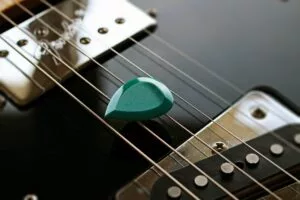
The Best Guitar Picks in Canada
A good guitar pick is essential for any guitar player.

The Best Karaoke Software
Party like it’s 1999 with karaoke!
